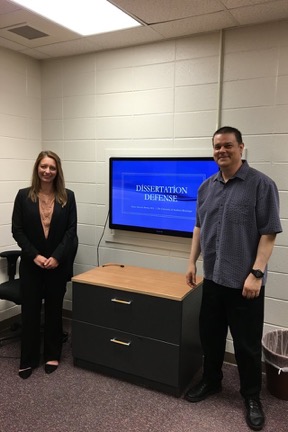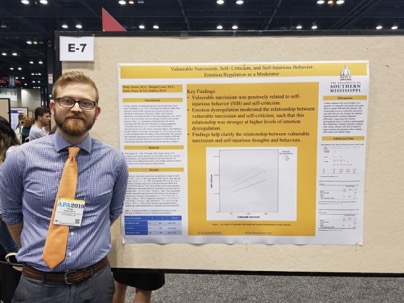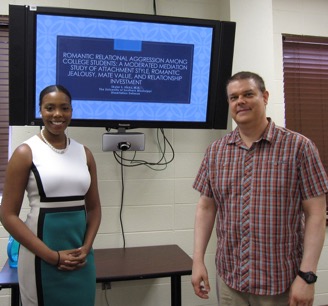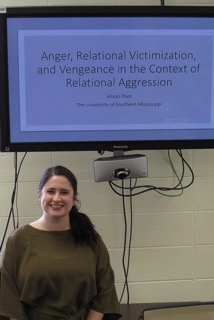
Director: Eric R. Dahlen, Ph.D.
Finding an Honors Thesis Adviser
11/16/19 Mentoring

One of the first steps in the process of completing an honors thesis involves finding a thesis adviser. Dr. Dahlen is happy to serve as a thesis adviser to honors students; however, there are usually more interested students than there are openings in the Anger and Traffic Psychology Lab. That means we need to be selective about who we accept.
Here are some tips for undergraduate honors students interested in working with Dr. Dahlen and the Anger and Traffic Psychology Lab:
- We are most likely to accept students who are willing to complete projects in our areas of research.
- We almost always have ideas for specific projects that would be appropriate for honors theses, and we are far more likely to accept a student who is willing to complete one of these projects. For example, Dr. Dahlen is especially interested in working with students on projects designed to examine the relationship of peer victimization and bullying to college student mental health and academic success.
- We often encourage students to use archival data sets for their projects rather than collecting new data, as this makes it far more likely that they will be able to finish on time.
- Students who work with us will be encouraged to attend our weekly lab meetings, and preference will be given to those able to do so.
Taylor Bolton Defends Dissertation
10/23/19 Aggression | Anger

After completing the revisions requested by her committee, Taylor plans to re-examine some of her analyses as we work on streamlining her study for publication. By eliminating some of the variables that contributed little and adding at least one covariate, we hope to end up with a more parsimonious model that will be helpful in understanding cyber aggression.
Congratulations to Taylor on the successful defense of her dissertation!
Taylor is in the process of applying for predoctoral internships next year. Defending her dissertation early will give her more time to focus on the internship experience.
Lab Represented at APA
08/12/19 About

Philip’s poster was based on his master’s thesis and described his finding that emotion regulation moderated the relationship between vulnerable narcissism and self-criticism. Hailee’s poster, which also utilized data collected as part of Philip’s thesis project but not used in his thesis, described her finding that anxiety moderated the relationship between peer exclusivity and relational aggression among college students.
Hailee is completing her honor’s thesis in the lab, and this was her first professional conference. She received a Discovery Scholar Research Grant from the Honors College at the University of Southern Mississippi, which supported her travel to Chicago.
Congratulations on a successful conference!
Skylar Hicks Defends Dissertation
06/21/19 Aggression

Of note, Skylar found that both anxious and avoidant attachment were positively associated with relational aggression and that these associations were mediated by romantic jealousy. There was some evidence that mate value moderated some paths; however, it did not do so in the manner expected. On the other hand, there was no evidence that relationship investment moderated the mediated relationships.
Given that relational aggression in the context of intimate relationships may be a risk factor for intimate partner violence, we believe that research aimed at improving our understanding of this behavior is beneficial. Skylar’s findings suggest that attachment style is likely to be relevant to romantic relational aggression through its relationship with jealousy.
Congratulations to Skylar on her successful dissertation defense!
Skylar will soon begin her predoctoral internship at a Federal Bureau of Prisons site, the Federal Medical Center - Fort Worth in Fort Worth, TX. By completing her dissertation prior to her internship year, she will have more time to focus on the internship experience.
Choosing a Thesis Topic
06/12/19 Mentoring

Even though a dissertation is more complicated than a thesis, most students find that selecting a dissertation topic is far easier than selecting a thesis topic because they know much more about research by that point. This post will focus on the doctoral student entering the program without a master’s degree and provide some tips on selecting a thesis topic.
Here are five things to keep in mind about selecting a topic for one’s master’s thesis:
- Students are encouraged to select a thesis topic consistent with the work we are doing in the lab. Occasionally, a new student may have a great idea for how to extend our work in a new direction; however, topics with little relevance to our work are unlikely to be approved.
- Once a broad potential topic area is identified (e.g., relational aggression among college students), narrowing it to identify the primary variables to be included and form tentative research questions will require the student to review the relevant literature. What are the current gaps in the literature on this topic? Where can one make a contribution by doing something different from what has been done before?
- Statistically, theses tend to be much less complex than dissertations. Some may only have 3-4 primary variables. One of the more common approaches we have been using in a number of recent thesis projects involves testing moderation or mediation. If we know, for example, that a variable we are interested in is positively related to relational aggression, we might ask whether another variable might help us understand the nature of that relationship (e.g., what might strengthen or weaken it, whether it depends on an intermediate variable).
- As important as the topic selected may seem, it is less important than being able to complete one’s thesis on time. Delays in doing so mean less time for completing a dissertation. Thus, topic selection must take feasibility into consideration. How large is the body of literature that will need to be reviewed? Can we recruit the participants we will need? Are psychometrically sound measures of the variables available?
- There is no such thing as a perfect study because we will never be able to include all potentially relevant variables and will always have constraints. A thesis that is completed on time, leads to a conference presentation and manuscript submitted for publication, and informs a student’s dissertation is about as close to perfection as we are going to get.
Alison Poor Proposes Thesis
05/23/19 Aggression

Ali’s primary focus will be on trait anger, anger rumination, and relational aggression. We expect that anger rumination will mediate the relationship between trait anger and relational aggression, much as it has in previous studies with overt aggression. Although vengeance is being included on more of an exploratory basis to inform future studies of relational victimization, we expect that the relationship between relational victimization and relational aggression may be mediated by vengeful attitudes.
Congratulations to Ali on a successful thesis proposal!
Lab Welcomes Amanda Dortch and Jacq Strowd
05/03/19 About

Congratulations to Jacq and Amanda on their admission to the master's program! We are looking forward to working with you.
Lab Welcomes Erica Van Overloop
03/24/19 About

Erica’s clinical work with children and families sparked an interest in trauma. She has some great ideas for how she might incorporate this interest in our work on relational aggression and victimization.
Congratulations to Erica on her admission to the doctoral program at the University of Southern Mississippi! We are looking forward to working with her.
